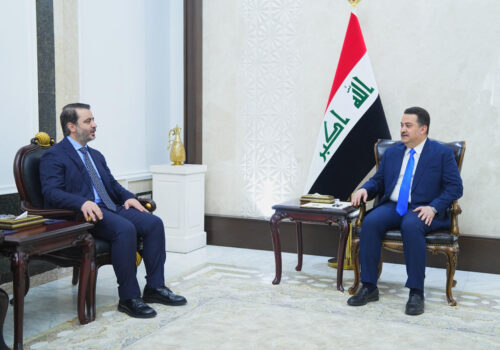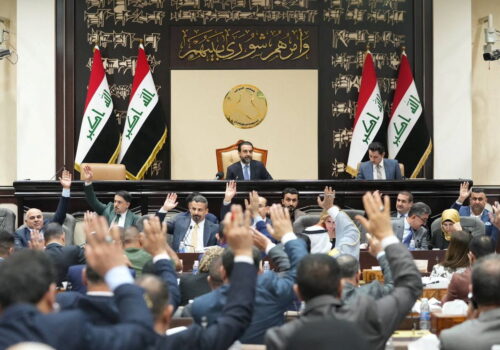Washington halted the Iraq-Iran electricity waiver. Here is how it’s perceived by Washington and Baghdad.
In the latest shift in Washington’s Iraq policy, the United States has removed the sanctions waiver allowing Baghdad to import electricity from Iran while leaving the exemption for Iranian natural gas in place. In the short run, this removal is unlikely to significantly impact Iraq’s immediate energy supply since Iranian electricity makes up only about two percent of Iraq’s total supply.
Removing the natural gas waiver, however, would have a more significant impact as it accounts for more than forty percent of the total supply. By making Iranian energy more costly, the United States hopes to incentivize Iraq to diversify its energy sources and reduce its dependency on Iran, a goal that the Iraqi government has long delayed despite being aware of its necessity.
The view from Baghdad by Ahmed Tabaqchali
Iraq’s power conundrum is essentially a large gap between supply and demand.
2023 estimates suggest that supply satisfies 82 per cent of demand, but almost forty per cent of generated electricity is lost during the transmission and distribution phases from an aging infrastructure, reducing supply to an estimated 53 percent of demand.
Moreover, high population growth and infrastructure recovery after decades of war are exacerbating this gap as power demand growth outpaces supply growth.
Iran’s first electricity exports in 2004, followed by its natural gas exports in 2017, have been crucial in addressing Iraq’s chronic electricity shortages. Starting with a 1 percent share of electricity supply in 2004, it reached a peak of about 41 percent in 2020. That share declined to about 31 percent in 2023, and it is projected to decline further in 2024.
Iraq is facing a coming summer demand surge that threatens to significantly exacerbate this shortage, paired with the loss of Iranian electricity, and potentially gas. Tehran will blame this on US President Donald Trump’s administration, but a significant loss of gas exports would have happened anyway this summer as Iran itself is forecast to have its own electricity crisis.
For Baghdad, diversifying its energy sources is critical to ensure a reliable supply. In other words, achieving energy security is not simply replacing current Iranian electricity and gas exports, but diversifying sources so Tehran’s exports become one of many sources, which in the process removes its, and any other supplier’s, leverage over Iraq.
This is a long-term process that demands significant investments across Iraq’s whole power infrastructure, including power plants that generate electricity, its transmission system that delivers electricity to population centres, and distribution networks that then ship this electricity to end users.
This opens significant, multi-year collaboration and investment opportunities for Iraq, its neighbours and its international stakeholders, especially the United States.
SIGN UP FOR THIS WEEK IN THE MIDEAST NEWSLETTER
The first arena includes electricity imports from Baghdad’s neighbors, such as from Jordan , the Gulf Cooperation Council Interconnection Authority (GCCIA) and close to home from Kurdistan Region of Iraq (KRI). The second is increasing gas supply sources like the expansion plans of Basra Gas Company and the Total Energies deal, developing untapped gas fields, and KRI gas potential through a resolution of the long-standing conflict over the development of the country’s oil and gas resources along the lines proposed by KRG and the Government of Iraq in 2023. Alos, the import of piped gas from Turkmenistan, and the import of Liquified Natural Gas (LNG) from either Qatar or the United States which in turns required significant infrastructure development. The third and fourth areas are to upgrade its transmission systems distribution grids, both responsible for the up forty percent of losses of the electricity generated.
Thus, embarking on joint long-term investments in the above areas is a win-win strategy for Iraq, its neighbors, and its international stakeholders.
The view from Washington by Anthony Pfaff
Ending the waiver on Iranian electricity imports, but not natural gas, is a smart strategic move for Iraq.
Removing these waivers is part of the Trump administration’s effort to impose “maximum pressure” on Iran. But the funds Iraq paid for Iranian electricity never directly reached Tehran—their use was proscribed but for limited categories of humanitarian trade overseen by the Treasury Department pursuant to the procedures in place since Trump’s first term in office. Still, these waivers enabled Iraq’s dependency on Iran for its energy needs, which may have made sense when ISIS was the primary threat to Iraq’s stability; however, it may not now, as that threat has receded and Iran’s threat to regional stability becomes more urgent.
The first Trump administration reimposed sanctions on Iranian energy exports in 2018 after withdrawing from the Joint Comprehensive Plan of Action (JCPOA) that restricted Iran’s ability to enrich uranium to develop nuclear weapons. To prevent destabilizing the Iraqi economy, the U.S. has granted waivers to the Iraqi government, allowing them to import Iranian electricity and gas to meet their short-term energy needs. Former president Joe Biden’s administration extended these waivers, requiring funds paid to Iran to go to accounts that could be monitored and used only for humanitarian purposes. As a condition for the waivers, the United States pushed Iraq towards its own energy self-sufficiency, including through agreements with French and Qatari energy companies and ongoing work to connect Iraq’s energy grid to the GCC’s.
Iraq may not need much incentive to diversify, especially considering the impending summer shortage. Even though the gas waiver remains intact, Iraq is already seeking to diversify its natural gas supply. That includes a deal with Turkmenistan, though the fact that its gas would travel through pipes going through Iran has limited its effectiveness. Baghdad has also sought agreements with Qatar and Oman to import natural gas, and recently signed an agreement allowing integration into the GCC electric grid, which will provide an additional 3.94 terawatt-hours of electricity. In fact, in a recent phone call with US National Security Advisor Mike Waltz, Iraqi Prime Minister Mohammed Shia al-Sudani reportedly underscored Iraq’s ambition to become energy independent and interest in greater involvement by Western and US energy companies.
By leaving the gas waiver intact, the United States ensures that Iraq can mitigate any resulting energy crisis, while giving Baghdad the flexibility it needs to pursue energy diversification without risking social instability or exacerbating the country’s energy shortages. Whether removing just one sanction will facilitate this transition will depend on Iraq’s Western and GCC partners increasing energy investment and cooperation while also enabling Iraq to endure any backlash from Iran or its proxies.
Despite concerns that decreasing Iraq’s access to any energy sources, especially during the summer in an election year, could increase instability, the removal of the electricity waiver can be a prudent measure for Washington to encourage both Iraq’s self-sufficiency and its Arab partners to support Iraq’s ultimate independence from Iran. It is in Washington’s interest, together with removing the waiver, to do whatever it can to help support those ongoing trends.
Impacts, and a way forward
The immediate effect of the loss of waivers to import electricity and potentially natural gas is almost zero, as Iran effectively halted its exports in late 2024, diverting its gas exports to its own domestic market.
Such diversions occurred a few times in the last few years, as a consequence of the negative cumulative effects of years of mismanagement, irrational consumption, and underinvestment in an aging infrastructure made worse by sanctions. However, this time, it’s much worse than any prior year, as Iran had rolling power blackouts across the country from November 2024, and natural gas was diverted from electricity generation to home heating to stave off social unrest.
But ending the waiver on Iranian electricity imports, while preserving the natural gas waiver, allows Iraq to break free from Iranian energy dominance at a manageable pace, reducing risks to its energy security and fostering regional cooperation. Meanwhile, it signals to Iran and the world that the United States remains committed to countering Iranian influence but in a way that prioritizes stability and pragmatic solutions. This measured approach is a necessary step in Iraq’s path toward energy independence, national sovereignty, and long-term prosperity.
Despite Iraq’s willingness, budgetary constraints can significantly hinder its efforts to diversify its energy sources. The government’s fiscal challenges are primarily due to its heavy reliance on oil revenues, which constitute approximately 90 percent of state income. A decline in global oil prices has exacerbated this issue, leading to reduced national income and fiscal pressures. In response, the Iraqi government has increased public spending, particularly on salaries and pensions, which account for over 40 percent of the budget, to maintain social stability.
This allocation limits funds available for infrastructure projects, including those aimed at energy diversification. Given that limited funds increase the likelihood of Iraq not living up to its financial commitments, foreign investors will disincentivize investing in projects to diversify and stabilize Iraq’s energy sources. So, without a finalized budget, the allocation of funds for these critical projects remains uncertain, delaying progress and perpetuating Iraq’s dependence on limited energy sources.
Another potential challenge is Iran-backed militias who smuggle Iraqi oil, diverting it from power generation. Given these interests, the political parties backing these militias may take action in parliament that impedes Iraq’s ability to diversify. Moreover, as Iran feels less secure due to the combination of regional setbacks, increasing Iraqi independence, and economic pressure due to sanctions, these militias may become more disruptive and further impede diversification by, if nothing else, making foreign investment too costly.
Given the budgetary, political, and security challenges described above, it is less clear whether Iraq can achieve energy diversity on its own. To alleviate those challenges, Iraq’s Western partners can facilitate this transition by taking the following steps:
- Condition Cooperation. As the US nudges Iraq towards energy diversification, it should condition any concessions or other support on continued investment in domestic energy infrastructure, renewable energy sources, and alternative regional partners, such as leaving the gas waiver intact.
- Encourage Regional Cooperation and Energy Alternatives. As described above, Iraq has been seeking new partnerships with the West as well as countries like Qatar, Oman, Turkey, and Saudi Arabia to provide alternative energy sources through electricity imports or investment in infrastructure projects. However, Iraq’s inconsistent payment record, coupled with expectations that there will be budget shortfalls in the near future, may limit interest, impeding Iraq’s transition to independence. Iraq’s partners may need to consider investment guarantees to sustain that investment.
- Contain Backlash. US pressure and Iraqi cooperation will likely place Iran in a position where it must disrupt Iraqi energy diversity or lose influence. While Iran-backed militias may play a role, Iran will also utilize political and economic means that could have unexpected impacts that may be difficult for the Iraqi government to manage. Efforts to make Iraq resilient should also be part of a comprehensive policy to incentivize its energy diversification efforts.
Despite these diversification efforts, Iraq’s way forward is clear: continue increasing effective investment in energy infrastructure while diversifying its energy suppliers so that it is not dependent on any one supplier. Improving energy efficiency can also help speed up Iraq’s transition to energy independence.
Ahmed Tabaqchali is a nonresident senior fellow with the Atlantic Council’s Middle East Programs. He is an experienced capital markets professional with over 25 years of experience in the US and MENA markets and is the chief strategist at the AFC Iraq Fund.
C. Anthony Pfaff is a nonresident senior fellow with the Iraq Initiative in the Atlantic Council’s Middle East Programs and the research professor for the Military Profession and Ethic at the Strategic Studies Institute (SSI), US Army War College in Carlisle, PA. A retired Army colonel and Foreign Area Officer (FAO) for the Middle East and North Africa, Pfaff recently served as director for Iraq on the National Security Council staff.
Further reading
Wed, Mar 19, 2025
Why the United States must bridge the Iraq-Syria divide
MENASource By Sarkawt Shamsulddin
With leverage over both capitals, the United States emerges as the linchpin in delicate diplomatic moment between Baghdad and Damascus.
Wed, Nov 6, 2024
Iraq’s 2024 budget: Not what it appears when it first meets the eye
Report By Ahmed Tabaqchali
Iraq’s budget update seems straightforward but holds hidden complexities. A closer look uncovers discrepancies between appearances and realities, offering insights into Iraq’s fiscal strategy and the structural challenges shaping its economic future.
Wed, Oct 2, 2024
After Operation Inherent Resolve: How to not mess up US-Iraq security relations again
MENASource By C. Anthony Pfaff
The importance of broadening US relations with Iraq beyond counter-terror operations cannot be overstated.
Image: People navigate boats near Nahr Bin Umar oil field, in Basra, Iraq June 30, 2024. REUTERS/Mohammed Aty


